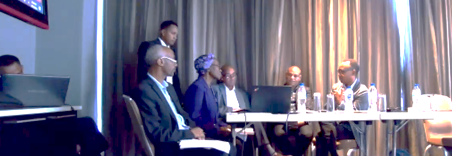Building Resilience into Food System Transformation in Ethiopia

On the 21st of September 2023 we held a joint workshop in collaboration with our distinguished partners in Ethiopia. The aim was to take a critical look at the evolving challenges facing food systems and to debate the opportunities and challenges inherent in strengthening the resilience of Ethiopia’s food systems.
The term ’resilience’ in this context denoted the capacity of food systems to endure shocks while minimising their adverse effects on functionality, and then swiftly recovering from disruption.
The event provided a valuable platform for experts and stakeholders to discuss critical issues related to food system resilience – and to inform the strategies for building resilience into food systems. This was considered essential for accelerating progress towards effective and sustainable delivery of the Seqota Declaration.
The event was led by Dr. Sisay Sinamo, Senior Program Manager at Seqota Declaration Federal Program Delivery Unit and involved senior experts from both the public and private sector in Ethiopia. The meeting opened with welcoming remarks by Adinew Abate, program manager at the Ministry of Health in Ethiopia. Tom Arnold from the Global Panel welcomed the event, placing it in the context of the Seqota Declaration and its ambitious goals. Celso Moretti, also from the Global Panel, emphasised the importance of the gathering at a time when threats to African food systems were becoming ever more diverse and intense. Patrick Webb developed on these opening remarks in a short presentation.
The first session explored in rich detail the challenges facing Ethiopia’s food system, and the threats they posed to delivering on the Seqota declaration – and in achieving further reductions in stunting in particular. Global factors, such as increasing global prices affecting food accessibility, were highlighted as particular threats to progress. In the open-floor discussion participants also discussed the threat of pandemics and conflicts that could derail progress. In moving to strengthen resilience, there was a need to take an expansive view of nutrition; to consider mental health in the context of nutrition; and to take account of rapid urbanisation and its impact on the population. In concluding the session, political will from the domestic government and multisectoral commitment and involvement (at all levels) were seen as key to anticipating and tackling shocks to Ethiopia’s food system. Also critical were sustainable practices and innovative financing.
The second session considered opportunities and actions to build sustainability – again framed by the delivery of the Seqota Declaration. Participants stressed the need for a holistic approach to nutrition interventions and a comprehensive strategy that assesses unintended consequences. Also important was a dynamic and flexible approach that can adapt to a rapidly changing world. A strategic country-level approach leveraging the diversity of agri-ecology and early warning systems was proposed. The urgent need to address climate change impacts on natural resources and land use was also underlined, with a need to focus on climate resilience and water sanitation in the implementation of the Seqota declaration. Robust disaster risk management strategies were deemed necessary to mitigate potential setbacks caused by unforeseen events. Participants emphasised the importance of creative resource mobilisation from both local and global sources, particularly against a background of growing resource constraints.
In the wider discussion the importance of engaging, empowering and encouraging communities in crisis situations was emphasised. Also important was the need to invest in infrastructure that addresses root causes rather than immediate symptoms – this was essential to achieving long-term sustainable solutions to crises.
In conclusion, this workshop demonstrated the energy and innovation of all attendees in tackling the considerable challenges facing food systems in Ethiopia. There was also a strong commitment to further engage and collaborate to ensure the Seqota declaration’s success.



